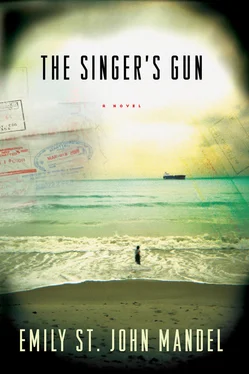“Sounds crowded.”
“Crowded doesn’t begin to describe it, actually.” Her gaze was steady. “Your friend Ilieva described it as a kind of living death. Imagine being locked into a room moving over the surface of the ocean. The air’s coming in through a small pipe, and there’s no light. The darkness is complete. Here’s the thing: one of the girls died in transit, and no one knows her name. These girls carry no identification.”
Ilieva: standing by the pastry case in the Russian Café, talking to the other waitress and laughing, bringing him a latte unasked and kissing him on the cheek, listening to him all those years ago as he explained the way it would work, asking intelligent questions while they were setting up the system. Ginger ale means I’m in danger. If I order it, go behind the counter and call Aria and tell her to come for me. Red wine means the count was correct. Water means it wasn’t. Ilieva laughing, Ilieva speaking in Russian to the old Eastern European men who used to come into the café sometimes, Ilieva gliding across the room with a glass of wine and a slice of cheesecake. Ilieva trapped in an airless room with a dead girl moving over the sea. Hard to reconcile this last horror with the serenity of his memories.
“All we know about her is that she was approximately seventeen to twenty years old and spoke only Ukrainian,” Broden said. “We tried to identify her, but the investigation went nowhere and none of the other girls knew her name. After a few weeks in the morgue she was buried in Potter’s Field along with the rest of the unclaimed and anonymous bodies that New York City had to offer that week, and her family will likely never know what happened to her. And it would be a terrible tragedy even if this were an isolated incident, but it isn’t. Shipping containers are an area of particular interest to me.”
A response seemed expected of him. “You’ve dealt with other shipping containers,” he said. He didn’t want to know the answer.
“One other, years ago, when I was with the NYPD. It came into the docks at Red Hook, the same as this last one did. There were certain similarities in the shipping manifest and the design of the secret room was almost identical. The docks can be chaotic,” Broden said. “Sometimes containers get misplaced. That particular container was lost in the stacks for nearly eight weeks.”
“Eight weeks,” Anton said. He felt ill.
“We don’t know why the importers didn’t make efforts to find their container,” she said. “It’s possible that our investigation was getting too close to them and they didn’t want to take the risk. In any event, the container held eleven young women from Eastern Europe. The coroner’s report listed them as being between the ages of eighteen and twenty-two, but I think one of them was much younger. This is the trade you’re a party to, Mr. Waker.”
“The thought of these shipping containers. .” Anton couldn’t finish the sentence.
“It isn’t what you wanted,” Broden said.
“It isn’t what I wanted. Of course not, of course it isn’t. If I’d known. . who would want something like that?”
“It’s more a question of who would accept something like that,” she said, “as a cost of doing business.”
“You’re talking about Aria.”
“Yes. And beyond that question— who would accept something like this? — the next question is, who will stop something like this from happening again? These shipments won’t just stop. It’s a lucrative trade. I know you tried to turn your back on Aria’s business, but Aria’s business continues with or without you.”
“I’m not sure what you want from me,” he said.
“I want you to tell me where Aria is, to start with.”
“I don’t know where she is. I’m sorry.”
Far down the beach, Elena was half-hidden by her sun hat. She had moved closer to the water so that her feet were lapped by waves.
“I visited your parents a few months ago,” Broden said.
A waiter had appeared. Anton ordered an Orangina. “You want anything?”
“No.”
“How were they?” he asked, when the waiter had left.
“Your parents? A little out of it, frankly.”
“What do you mean, ‘a little out of it’?”
“I mean shaken,” Broden said. “I mean your father’s hands were shaking while he was touching up a figurehead, and your mother looked like she hadn’t slept in a week. When I came to the store your mother was sitting on the loading dock, just staring at the river. She told me you used to sit there with her.”
“Yes. I did.”
“Then I asked your mother where you were,” Broden said, “and she said, He’s in a far-off country. ”
“Those were her exact words? A far-off country?”
“A far-off country. That’s what she said. And I wasn’t sure what she meant by that,” Broden said, “but it seemed to me that she wasn’t just talking about Italy.”
“We had a dog when I was little,” Anton said. There was strain in his voice. “It was my parents’ dog from before I was born, and me and Aria used to play with him. We were really little, maybe five at the most. Anyway, the dog got old and sick and my parents had to have him put to sleep, and then when me and Aria asked where the dog had gone, my mother said, He’s gone away to a far-off country. ”
“I see. Do your parents still think you’re dead?”
Anton was silent.
“I don’t know,” he said finally. “I don’t speak to them anymore.” The waiter had returned with an Orangina. He lifted the bottle to his lips, grateful for the distraction.
“To tell you the truth, I wasn’t entirely surprised by your parents’ demeanor. I thought you were dead too.” She was looking steadily at him. “I think you were asked to perform a transaction,” she said, “but it wasn’t like all the other transactions you’ve performed over the years. Something went wildly wrong for you. Aria told your parents you were dead, and then I think she fled the city.”
“She could be anywhere,” he said.
“The penalties for dealing in false passports are stiff these days,” Broden said. “Now that you’ve turned up alive, I’m afraid you’re in a certain amount of legal peril. I have you on tape describing the way the operation worked. I can produce a witness who bought a passport from you. And Ilieva speaks highly of you, don’t get me wrong, but she won’t lie under oath. You’re looking at a decade in a federal prison. But I’ll tell you a secret, Mr. Waker. I’m much more interested in finding the origin of that shipping container than I am in having you prosecuted for selling fake passports. If you were to tell me where Aria is, I might be willing to negotiate.”
“I don’t know where she is,” he said. He had a strange feeling that he might be dreaming. All his thoughts were of Elena, of the unborn child, of how to keep them safe, and his heart was beating very quickly.
“I’d like you to hear something.” Broden reached into her bag and placed a small electronic device on the table between them. “This is a phone call that was taped some months ago.”
She pressed a button and over the sounds of the ocean Anton heard a voice. A man speaking in a British accent: It’s done. And then Aria: Thank you. We’ll speak again soon.
“When was this recorded?” he asked, but he already knew. His voice was unsteady.
“That call was recorded two days before the shipping container arrived in Red Hook,” Broden said. “This was the night of Friday October 21st. It was early evening in New York, eleven P.M. in Italy. Aria was gone by the time police arrived at her apartment.”
The night of Friday October 21st. Standing by the sliding glass doors in the darkness of his hotel room, waiting in silence as four shadows came down the side of the islet and passed by the hotel. Footsteps on the cobblestones, a laugh, a car starting up the hill beyond the gates of Sant’Angelo. They had called Aria ten or fifteen minutes later.
Читать дальше





![Ричард Деминг - Whistle Past the Graveyard [= Give the Girl a Gun]](/books/412176/richard-deming-whistle-past-the-graveyard-give-t-thumb.webp)






